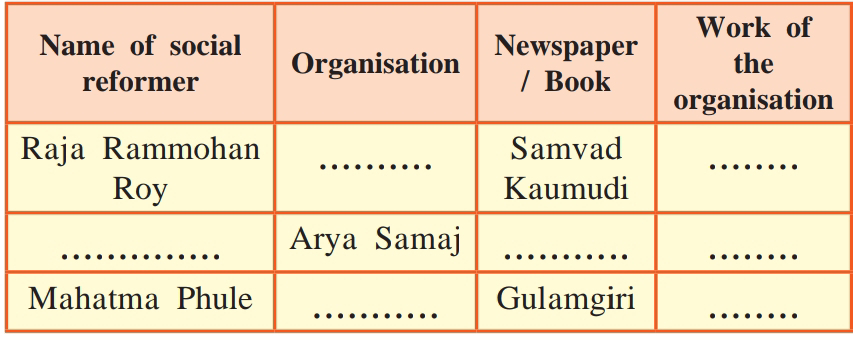10th History 5. Challenges faced by Indian Democracy/Textual exercise /questions and answers /maharashtra state board questions and answers
10th History 5. Challenges faced by Indian Democracy
1. Choose the correct option from the given options and complete the sentences. (1) In a democracy ............ participate in elections and get political power.
(a) political parties
(b) courts
(c) social organisations
(d) none of the above
Ans: In a democracy political parties participate in elections and get political power.
(2) The major challenge faced by all democratic nations in the world is ............ .
(a) Religious conflicts
(b) Naxal activities
(c) Deepening the roots of democracy
(d) Importance to muscle power
Ans: The major challenge faced by all democratic nations in the world is Deepening the roots of democracy
2. State whether following statements are true or false. Give reasons for your answer.
(1) Alertness is required to sustain democracy.
Ans: True.
1.In order to make democracy successful it should be practised by people in all aspects of their life. It should not remain limited at the government level.
2.Conscious effort should be taken to keep the rights of the people intact.
3.The different challenges faced by democracy like corruption,violence and criminalisation should be tackled timely and strictly.
4. It is necessary that people and the government should remain alert for the sustenance of democracy.
(2) Importance of the problems of farmers and tribals has increased in the left extremist movement.
Ans: False.
1.Landlords confiscated lands of farmers and tribals.
2.Naxalite movement was started to remove injustice against the landless farmers and tribals.
3.But later the problems of farmers and tribals lost its focus and became violent.
4.They adopted violent ways like to attack army, police and oppose the government.
The importance of farmers and tribals decreased in the leftist movement.
(3) People may lose confidence in the democratic process due to corruption during elections.
Ans: True.
1.In order to strengthen democracy, it is important to conduct elections in a free and fair atmosphere.
2.There are instances of .the election process getting affected by corruption.
3.Bogus voting, bribing the voters, abducting voters and ballot boxes, distributing articles to lure voters and other such things take place.
All these things make people lose faith in the democratic process.
3. Explain the concept.
(1) Left-extremism
1.Left extremists - Naxalism : Naxalism is a major problem in India. Naxalism began as a movement to remove injustice against aggressive landless farmers and tribal people.
2.But today Naxalism has become a violent struggle. In the Naxalite movement the importance of the problems of farmers and tribal people has reduced.
3. Instead, violent measures to oppose the government policies, attacking the police forces and such other tactics are used by the Naxalite groups.
(2) Corruption
Ans:1. It is a form of dishonest or unethical conduct for personal gain by people at influential position.
2.It is found at all levels economic, political, social and at government levels. 3.The misuse power is also corruption.
Bogus voting, giving bribe to voters, are examples of corruption in the election process.
4.Hoarding of goods and then selling them at price more than the market yalue is also a way of corruption.
5.Corruption in the public and private sector is the biggest problem in India.
6.People develop distrust and dissatisfaction about the entire system. They lose trust in democracy because of corruption.
4. Answer the following questions in brief. (3) Which factors are required for the success of democracy in India ?
Ans: The following factors are required for the success of democracy in India:
1.Though democracy is the government of majority the opinions of minorities, religious, ethnic and lingustic should be included in the decision-making process.
2.Stringent laws must be implemented to stop criminalisation of politics.
3.Efforts should be made not only at the level of the government but also at social and personal level.
4.Decisions about important public policies should be taken after interaction with the people.
5.Participation of people should increase in all government undertakings.
(2) What are the effects of criminalisation of politics ?
Ans: The following effects are seen due to criminalisation of politics:
1.Money and muscle power gets undue importance.
2.Violence increases during elections and it becomes difficult to hold elections in free and fair environment.
3.Terror seizes the mind of people and their participation becomes less in administration.
4.People lose their tolerance and the development of democracy does not take place.
(3) What efforts are undertaken to bring transparency in political process ?
Ans: 1.An independent Election Commission is appointed to hold free and fair elections.
2.Stringent laws are made to stop criminalisation of politics.
3.Laws are formed to stop corruption in politics and elections.
4.Courts have banned people who are corrupt and those having criminal background or criminal allegations from taking part in political process.


Comments
Post a Comment